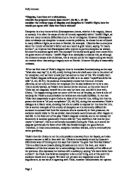Describe the different forms of disguise and deception that feature in the Twelfth Night
Describe the different forms of disguise and deception that feature in the Twelfth Night.
Disguise and deception play significant roles in Shakespeare’s romantic comedy Twelfth Night. Shakespeare places emphasis on these somewhat “wickedness” (A2 S2 L26) traits to somehow create a traditional romantic comedy; where despite the negative ideas of disguise and deceit play a prominent role, love blossoms and a happy ending prevails. The tireless use of these ideas in different forms and guises, which endure throughout the whole play highlights the themes of love, madness and appearance versus reality; where disguise and deceit both take credit for possessing a major responsibility in providing twists, turns and humor in the main and sub-plots.
Orsino is the first character introduced to the play. He is the Duke of Illyria and therefore the most powerful character implemented into Shakespeare’s play. Upon his arrival to the story, he immediately disguises his ignorance of love by speaking in poetics form to deceive the audience and the characters around him. “If music be the food of love, play on” (A1 S1 L1) is promptly contrasted in line 7 “Enough, no more; ‘Tis not so sweet as it was before”. This contradiction implicates his ignorance of what love is really about. His vocabulary and figurative language, both influenced by poetic speech does well to fool everyone that he is not what he seems. People would see Orsino as a likeable character that carries the aura that he can achieve anything; he is a self-absorbed man who thinks very highly of himself. But this is obviously not the case as Orsino has been shown to be just like everyone else, even with his power in Illyria, Orsino has his flaws too.
Feste also uses his language to disguise aspects of his character. However, contrasting the stance of Orsino, Feste shows his wit and intelligent by smugly playing on words and with the medium of music. An example of Feste’s clever play on words was during the conversation he had with Viola who was at the time disguised as Cesario; “…send thee a beard” (A3 S1 L45). Although everyone had been fooled by Viola in convincing them that the Cesario character is real, Feste (who is the fool) hints that he may know Cesario’s true identity. Feste himself does not describe himself as Olivia’s fool “but her corruptor of words” (A3 S1 L37). Indeed it can be viewed that he is only paid to be the fool, to act like a madman with wit; and in actual fact he is the most sane character and intelligent in the play. He shows his intelligent by irrelevantly expressing his words in another language, “cucus, non facit monachum:” (A1 S5 L53). Feste is the only character wrapped up in all the plots yet keeps an outside perspective of each by showing no emotion in his speech or actions. But in light of this, his emotions are brought to the surface when he entertains people with his music. The realization that Feste is has the most knowledge of love, or what real love is, begin to seep through as he sings. “What is love? ‘Tis not hereafter, Present mirth hath present laughter:” (A2 S3 L48). Unlike Orsino who believes that everything will work out okay when you fall in love, Feste believes that the future is always uncertain “What’s to come is still unsure” (A2 S3 L50). He also concretes his perspective that love should not wait as we will not be young forever; “Youth’s a stuff will not endure” (A2 S3 L53). Although his character does not show emotions whilst playing his role in each plot; his music, which varies from melancholy ballads to contemplative, express that there is much more to Feste than meets the eye. Feste’s past is shrouded in mystery, and elements of his past still live in his music. “And we’ll strive to please you everyday” (A5 S1 L 407) ends the play. Regardless of his past that he disguises through music, Feste feels that his duty now is to make people laugh. He expresses with this idea that our duty in life is to be happy and to make others happy, something he harassed Olivia about in Act1 as she mourned her brother’s death. Despite many features of Feste’s character that show his has much more depth than what we are led to believe; he also uses disguise and deceit to concrete his role as a fool, a clown who provides humor and entertainment for the audience. “Sir Topas the curate, who comes to visit Malvolio the lunatic” (A4 S2 L22). Upon learning of Sir Toby and Maria’s gulling of Malvolio, Feste decides to join in the fun. He does this by pretending to be someone else when visiting Malvolio, to further his torture and suffering. Malvolio and Feste’s turbulent past had been briefly documented when in Act 1 Malvolio says “I marvel your ladyship takes delight in such a barren rascal” (A1 S5 L81). It’s interesting to take into account that Feste is supposed to be the fool of the play, but he doesn’t setup the humorous gulling of Malvolio and fails to provide the entertainment and humor Sir Toby Belch and Sir Andrew Aguecheek bring to the play. Instead Feste takes part of the humor only with revenge on his mind and not to provide humor, and relies only on quick plays on words to supply humor. This could be Feste disguising that he is not comfortable with his role in life as the fool.






